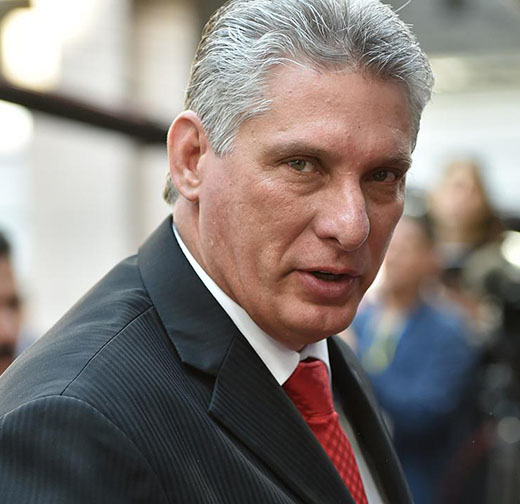HAVANA, (Reuters) – Cuban President Miguel Diaz-Canel accused the Trump administration yesterday of dragging relations with the United States to their worst level in decades and called on Cubans to strengthen the Communist-run country’s defenses and economy.
Diaz-Canel, in a speech closing the National Assembly, said the United States is engaging in an “asphyxiating financial persecution that makes the import of goods and resources of primary necessity particularly difficult.”
The Cuban economy has stagnated in recent years in tandem with the implosion of strategic ally Venezuela, resulting in cuts in fuel and energy use by state entities and this year shortages of basic goods such as bread, chicken and eggs.
An increase in U.S. sanctions under President Donald Trump is also making it even harder for cash-strapped Cuba to get credit from financial institutions.
Cuba’s Economy Minister Alejandro Gil Fernandez earlier in the day called on the government to tighten belts further and seek alternatives to imports, as foreign exchange earnings decline and credit for supplies and investment become more difficult to find.
“Exports are not growing as planned. The levels of foreign investment that the economy demands are not materialising,” Gil said. “We can forecast the import plan will not be fulfilled because the credits we need cannot be finalised due to the arrears of payments of debts.”
Cuba relies on imports directly or indirectly for much of what it produces and consumes, including fuel and food, and purchases the supplies with foreign currency it earns from exports and obtains through credits.
The government has been struggling to keep economic growth in the black and forecast a 1.5 per cent increase in gross domestic product this year after a 1.2 per cent increase last year.
The Trump administration has said Cuba is responsible for the survival of socialist Venezuelan President Nicholas Maduro and slapped new sanctions on Cuba, which is already under a crippling trade embargo, leaving the detente of former president Barack Obama in the dust.
This month the United States sanctioned vessels and companies that ship oil to Cuba from Venezuela in exchange for health and other technical services, threatening the energy grid and transportation.
The Trump administration says it soon may activate a long dormant law under which Cuban-Americans could sue foreign companies that profit from their properties nationalised during the first years of the 1959 Revolution.
“Our response is no, imperialist gentlemen, we Cubans do not surrender,” Diaz-Canel said yesterday, adding the situation meant “we have two absolute priorities: the preparation of our defense and the economic battle at the same time.”
According to western diplomats and businessmen, Cuba has failed to pay suppliers on time for a number of years, piling up around $1.5 billion in short term debt.
Trade fell around 25 per cent from 2013 through 2017 and declined again last year, according to the government.
In addition to the Venezuelan crisis, the advent of a far-right government in Brazil led last year to the scrapping of a doctors-for-cash deal valued at an annual $300 million.

